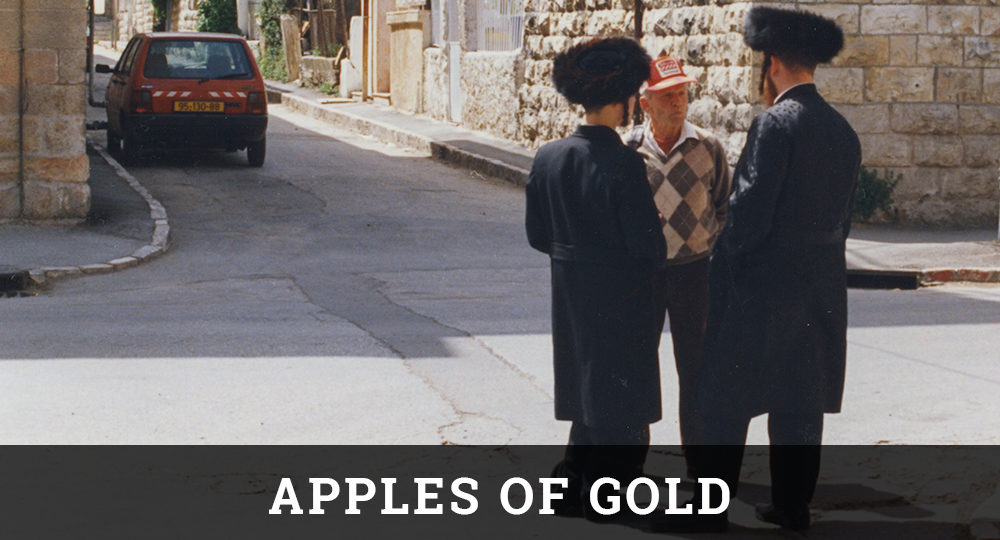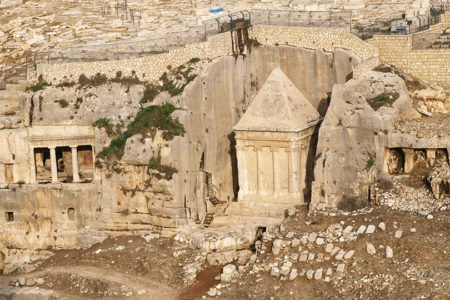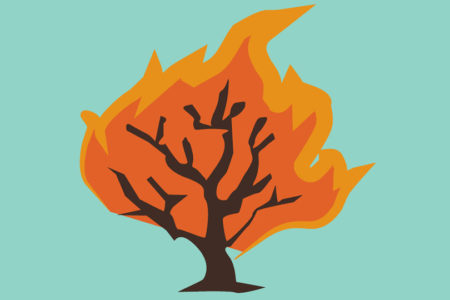Zvi Nov/Dec 2008
We are approaching the great holiday of Christmas. At this time of year, people do not forget me. In fact, some of the ultra-Orthodox men to whom I have spoken about the Lord like to make fun of me. They know where to find me, and they come with their teachers to jeer me. This is their way. They do not like Jewish people who have placed their faith in Christ.
But the Lord promises never to leave us or forsake us (Heb. 13:5). So I did not worry when they came one morning and greeted me sarcastically, “Congratulations to you, Zvi!”
I already knew what they would reply when I asked, “Why are you congratulating me?”
“You don’t know?” they mocked. “Your God is born!”
I did not need a lawyer to know how to argue with them. “You are going against yourselves,” I replied.
“What do you mean?” one asked.
“You call yourselves the Chosen People of God. But you do not do right by God. It is written in Isaiah 2:3, ‘For out of Zion shall go forth the law, and the word of the Lᴏʀᴅ from Jerusalem.’ But take a good look at what is going out of Zion! People like you do not spread the truth about God because you do not understand it, even though you read it every day in your synagogues.”
Now they wanted to know what I meant because they realized I was not speaking about the New Testament.
So I gave them my Bible and told them, “Please, read Deuteronomy 6:13–15.” There it is written,
You shall fear the Lᴏʀᴅ your God and serve Him, and shall take oaths in His name. You shall not go after other gods, the gods of the peoples who are all around you (for the Lᴏʀᴅ your God is a jealous God among you), lest the anger of the Lᴏʀᴅ your God be aroused against you and destroy you from the face of the earth.
They were now extremely surprised. “How do you read our Bible and yet believe in This Man?” as they call Him. They will not utter the words Jesus Christ.
“You study all your lives in those many yeshivas,” I replied. “Yet your hearts are empty, and you have no true knowledge of the Lord.”
“Show us where it is written in the Bible about your God?” one asked. Now we had arrived at the point.
“He is not only my God but the God of all the people on Earth,” I said.
“Where is it written?” they asked again. So I opened the Bible to Isaiah 53.
“If you know enough Hebrew, then read! If not, I will read it for you,” I said. The ultra-Orthodox do not converse in Hebrew because they consider it a holy language. They speak Yiddish.
“We were born here!” one said. “We know how to read Hebrew!” So they began, growing thoughtful as they read:
He is despised and rejected by men, a Man of sorrows and acquainted with grief. And we hid, as it were, our faces from Him; He was despised, and we did not esteem Him. But He was wounded for our transgressions, He was bruised for our iniquities; the chastisement for our peace was upon Him, and by His stripes we are healed. All we like sheep have gone astray; we have turned, every one, to his own way; and the Lᴏʀᴅ has laid on Him the iniquity of us all (vv. 3, 5–6).
Looking at one another, they asked, “About whom is this written?Who is this one?” Immediately the older men tried to persuade the younger ones to leave. But the younger ones persisted: “About whom is it written here?” So they turned from one another, and they asked me.
“About This Man,” I replied. “And not only is it written about Him here but in other places of the Bible as well.” So I showed them Zechariah 9 and Isaiah 9:6–9.
The students turned to their teachers and asked, “Why have we never heard about this? Why have you never taught us what is in our Holy Bible?”
The older teachers were extremely unhappy and tried to find a way to discredit me. Confident they could trap me, they demanded, “Zvi! Show us where it is written that the Messiah was born in Bethlehem? Can you show us this? But do not use any of those Christian books. Show us only from the Bible!”
I had been waiting a long time for this very question. I had not had the courage to bring up the subject. Now I replied, “Read Micah 5:2. But read aloud so that your young pupils will be able to listen well and know what you have hidden from them. Read, so they will know the truth.”
There it is written,
But you, Bethlehem Ephrathah, though you are little among the thousands of Judah, yet out of you shall come forth to Me the One to be Ruler in Israel, whose goings forth are from of old, from everlasting.
The young men now had many more questions for their teachers, who were not happy. After a while, the students thanked me for speaking with them and giving them a clear picture about the faith. “We will come again and ask you more questions,” they said.
I pray they not only will ask questions but also believe according to the Bible so that they will know the Lord personally. Then they, too, will appreciate this wonderful time of year and celebrate the birth of the Jewish Messiah who came to redeem us from sin, as prophesied in the Hebrew Scriptures.







